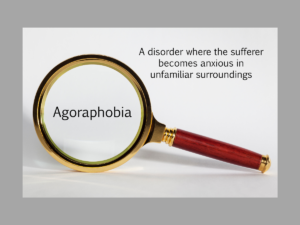Agoraphobia: The Phobia That Keeps You Locked In
As things have opened up, some people are feeling overwhelmed at trying to “get back to normal”. From working at home for two years to returning to busy metros and populated festivals, adapting to a world where Covid still exists can be challenging. For a small percentage of the population–people struggling with agoraphobia–the lockdowns associated with the pandemic were a mixed blessing. Now that things have changed again, what is it like to live an isolated life?
Agoraphobia is a type of anxiety disorder triggered by being in open places and with crowds. It can be prompted by experiencing one or more panic attacks. Characteristics of agoraphobia can include:
- Safety behaviours (ex. shopping online to avoid going out for errands)
- Fear of losing control in public
- Fear of places with no easy exits
- Avoiding areas where anxiety may be triggered
- Not leaving home for extended periods of time
- Depending on others because of an inability to do tasks independently
The stress of potentially not being able to quickly leave a situation or receive help during moments of anxiety can be strong enough for a person to avoid specific scenarios. They may dodge circumstances where they could feel trapped, stuck, or helpless. Examples include public transportation, waiting in line, being in crowds, and being in enclosed or open spaces. In severe cases, this can lead to being completely housebound.
It is common for people experiencing agoraphobia to have a limited number of places where they feel comfortable. Many have trouble leaving home for essentials, such as school, work, or shopping. This constant fear can affect their quality of life by making it difficult to maintain social relationships. The stigma surrounding mental illnesses can also make it very difficult for people to open up about their issues, deepening their feelings of loneliness and shame. They often rely on others in their daily lives as they cannot run errands on their own.
The pandemic affected people experiencing agoraphobia greatly and potentially even triggered its onset in others. Pre-pandemic, anxiety in crowds could often be dismissed as being irrational or just nerves, but now being with people posed a very real threat. When lockdowns were in full swing, many felt progress made was lost as they could no longer expose themselves to the outside world to overcome their social anxiety. With limits on visits, the panic of being left alone if their caregiver got sick was constantly looming.
On the other hand, the pandemic made it easier for people living with agoraphobia in some ways, like contactless food deliveries, online shopping, and web-based events. Many found comfort in not having to constantly face the dreaded activities of life. They could actually avoid the discomfort of the outdoors and crowds altogether! Services such as therapy and doctor’s appointments becoming more widely available online were a benefit for people who are housebound. Connecting remotely can be a step towards being able to ultimately attend a meeting in person.
Help exists for treating agoraphobia, and recovery is possible. However, it can be hard to attend appointments when leaving home is a struggle. Adapted solutions do exist. Books and online activities about cognitive behavioural therapy (for example) can be beneficial. Exposure therapy is very relevant to this illness as it involves controlled exposures to triggers to desensitize the patient to a specific fear, enabling them to feel less stressed in the actual situations. It can even be introduced at home in various ways, such as viewing pictures and videos in addition to visualising the errand or experience. Going through it mentally can remove the anxiety of the unknown.
While being able to manage agoraphobia and triggers is a long process, any step, big or small, is a step in the right direction.
– Julianna De Pascale
From Share&Care Winter 2023
For more information and resources, visit amiquebec.org/anxiety.
AMI-Quebec offers online support groups for people living with anxiety and also for anyone living with any mental illness (Kaleidoscope). Visit amiquebec.org/support for more information.
Visit amiquebec.org/sources for references
Sign up for our emails to stay in touch
Please also follow us on:



